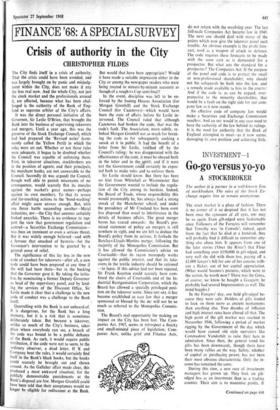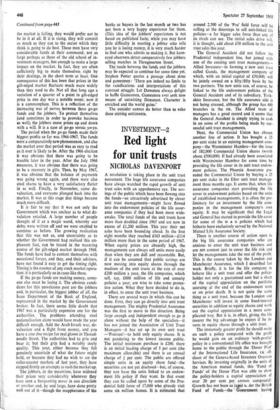Go-go versus yo-yo
INVESTMENT-1
A STOCKBROKER
The author, is a partner in a well-known firm of stockbrokers. The rules of the Stock Ex- change require him to remain anonymous.
The stock market is a place of fashion. There is no corner of it so despised that it has not been once the cynosure of all eyes, nor may be so again. Even gilt-edged were fashionable once. Followers of the Forsytes will remember that Timothy was 'in Consols'; indeed, apart from the fact that he died at a hundred, they will probably find it difficult to remember any- thing else about him. It appears from one of the later stories ('Over the River') that Fleur had something over £150,000 in gilt-edged, and very well she did with them too, paying off a £1,000 lawyer's bill for one of her cousins with- out a flicker, out of her capital appreciation. (What would Soames's pictures, which went to the nation, be worth now? There was the Goya, of course; we know he bought a Gauguin; he probably had several Impressionists as well. The mind boggles.) In the Forsytes' day, one held gilt-edged be- cause they were safe. Holders of gilts tended to look on them more as ancient monuments than anything else. Two decades of inflation and high interest rates have altered all that. The high point of the gilt market was reached in November 1946, following a period of market rigging by the Government of the day which would have caused old style operators like Commodore Vanderbilt to raise their hats in admiration. Since then, the general trend for gilts has been downwards, though there have been many rallies on the way. Safety, whether of capital or purchasing power, has not been their most obvious characteristic. Only the in- come has remained the same.
During this time, a new race of investment managers has grown up. They look on gilt- edged less as an investment than as a trading counter. Their aim is to maximise profits. If Continued on page 446
Continued from page 443 the market is falling, they would prefer not to be in it at all. If it is rising, they will commit as much as they can to the sector which they think is going to do best. These men have very considerable funds at their command; not as large perhaps as those of the old school of in- vestment managers, but enough to make a large impact on the market. In fact, they are often sufficiently big to make themselves right by their dealings, in the short term at least. One consequence of this has been that prices in the gilt-edged market fluctuate much more widely than they used to do. Not all that long ago a variation of a quarter of a point in gilt-edged price in one day was a notable event; now it is a commonplace. This is a reflection of the increasing war of nerves between these go-go funds and the jobbers. To protect themselves (and sometimes in order to provoke business as well), the jobbers move prices up and down with a wilL It is a case of go-go versus yo-yo.
The period when the go-go funds made their biggest profits so far was 1966-1967. The funds were a comparatively new phenomenon, and also the market over that period was as easy to read as it ever is likely to be. After the 1966 election it was obvious that there was going to be trouble later in the year. After the July 1966 measures, it was obvious that there was going to be a recovery in gilts. Then, by May 1967, it was obvious that the balance of payments was going wrong again, and there were also steel shares to have a very satisfactory flutter in as well. Finally, in November, came de- valuation, and everyone plunged back into the Market. It was at this stage that things became much more difficult.
It is fair to say that it was not only the Government which was unclear as to what de- valution entailed. A large number of people thought of it as a magic wand, whereby our debts were written off and we were enabled to continue as before. The growing realisation that this was not so, and uncertainty as to whether the Government had realised this un- pleasant fact, can be traced in the wavering course of the gilt-edged market through 1968. The funds have had to content themselves with occasional forays, and they, and their advisers, have not found it easy to get the timing right. Timing is the essence of any stock market opera- tion; it is particularly so in cases like these.
If the go-go funds are making money, some- one else must be losing it. The obvious candi- dates for this unwelcome post are the jobbers and, in particular, the biggest jobber of all, the Issue Department of the Bank of England, represented in the market by the Government broker. In fact, there seems little doubt that 1967 was a particularly expensive one for the authorities. The problems attending steel nationalisation alone would have made the year difficult enough. Add the Arab-Israeli war, de- valuation and a flight from money, and you have a sine fine recipe for real gloom in Thread- needle Street. The authorities had to grin and bear it; but their grin had a notably steely quality. This year, either because they felt genuinely uncertain of what the future might hold, or because they had no wish to see the roller-coaster markets of last year, they have stepped firmly on attempts to rush the market up.
The jobbers, in the meantime, have widened their prices very considerably whenever they have seen a burgeoning move in one directioh or another and, by and large, have done pretty well out of it—though the reappearance of the banks as buyers in the last month or two has not been a very happy experience for them. (This idea of the jobbers' experiences is not based on published facts; while you may have little difficulty in meeting a jobber who tells you he is losing money, it is very much harder to find one who admits to making it. But keen- eyed observers detect comparatively few jobbers selling matches in Throgmorton Street.
The tussle between the funds and the jobbers may Ge expected to continue for some time yet. Stephen Potter quotes a passage about dons and gamesmen : 'There are indeed no limits to the ramifications and interpretations of this constant struggle. Let Donsmen always delight to baffle Gamesmen, Gamesmen ever seek new means of outwitting Donsmen. Character is enriched and the world gains.'
The outsider cannot do better than to echo these stirring sentiments.











































 Previous page
Previous page